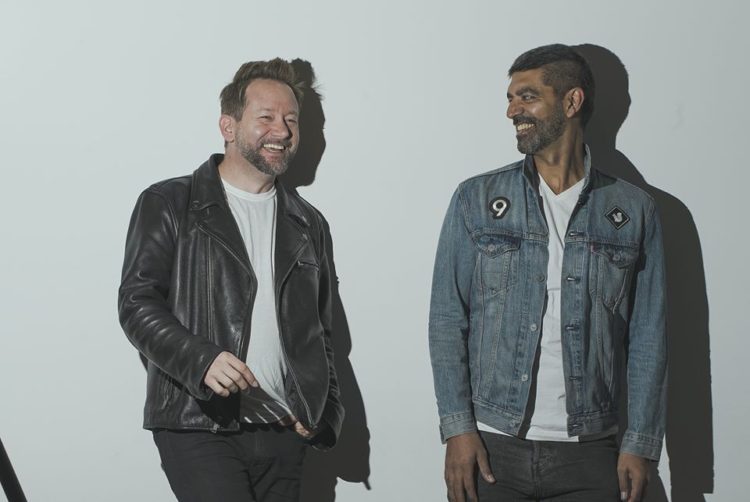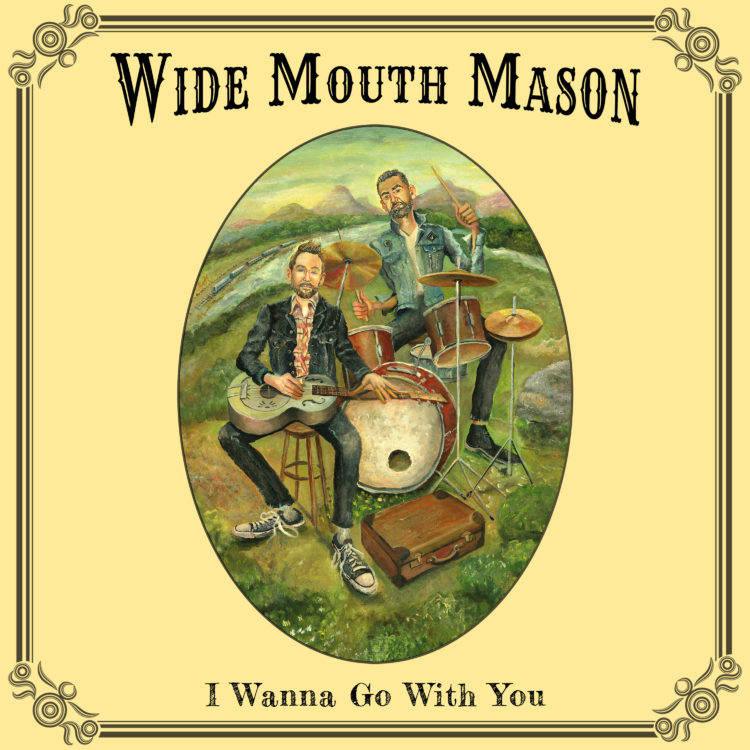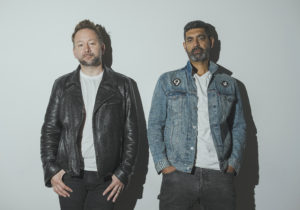
Oct. 25 saw the release of the first Wide Mouth Mason album in almost nine years. A captivating, compelling and infinitely enjoyable exploration of more down and dirtier, straightforward traditional blues music, with a decidedly 21st century thematic twist, I Wanna Go With You is a blessed relief for long suffering fans waiting to follow band members Safwan Javed and Shaun Verreault on a new musical journey.
Response to the album has been elation from fans and loads of positivity from the blues cognoscenti, leading to a revitalization in popular veteran act, which burst onto the scene from Saskatoon in the mid-1990s with blues-infused alternative rock songs like Why, My Old Self, Midnight Rain, Companion (Lay Me Down) and Smile.
Credit for the creative resurgence and return to recording by Wide Mouth Mason can, in large part, go to a renewed fascination the always curious and experimental Verreault had with a lap steel guitar – an instrument that has now become a focal point of the band’s compositions, recordings and live performances in this new chapter. I Wanna Go With You is the remarkable first outpouring of artistry from this new adventurous musical rabbit trail.
“I had a lap steel that had been gifted to me by a friend. I basically offered it to a studio in town, because at the time I couldn’t really make sense of it. I play a lot of bottle neck slide, but when I was faced with this lap steel, all I could do on it was sound like a worse version of other people – I couldn’t really make it speak with my voice. And then one day in a trailer parked outside that studio I was with Ryan Dahle [Age of Electric, Limblifter] who ended up working on this new record with us. I was just sitting there and plucking away on this lap steel and discovered that if I put slides on more than one finger on my left hand, I could start to do some of the stuff I do when I play regular bottle neck slide, but I could also do some other stuff, like have the voices move in different directions, and have one be static and the other moving,” he explained.
“It led me back to the woodshed to practise like I haven’t done since I was, like 12 or 13; just hours a day with the thought that, okay, I think there’s some potential in this new style of playing and I am really going to put in the 10,000 or more hours and really explore it and figure out how to do it. And, honestly, I wouldn’t have been able to do that if we were on the road, travelling doing gigs as much as we used to. But when I was being a daddy during the day and then playing at night and taking off for a couple of days at a time and coming back, I really just threw myself into exploring that, which has led to the guitar style and songwriting that is all over our new record, I Wanna Go With You.”
Becoming a dad to his young daughter not long after the ending of the touring cycle for the band’s previous album, No Bad Days, which was released in 2011, led the now Vancouver-based singer/songwriter/guitarist to re-orient his priorities in a positive way for him and his family. He still played gigs, but also delved deeper into collaborating locally, as well as continuing to produce albums by other artists.
“I was resolute that I wouldn’t watch my one and only child grow up on my phone. While we were making No Bad Days, my wife and I were making a little human. Once my daughter was born, I just didn’t want to see any first steps on Facetime while I was standing in the parking lot of a club that we’ve played a bunch of times halfway across the country. We were still playing shows, but we would go off and do two in a row, or three in a row and then come right back home. I really wanted to focus on being there for my kid and being a dad.
“Another interesting side effect of that, besides being able to explore the lap steel, was I’ve really learned how to sing using a quieter voice, which I’ve never really done before. I have always been more of a shouter. But I got in touch with different registers of my voice by singing more quietly.”
At the same time, the other Wide Mouth Mason co-founder, and original member Safwan Javed continued working at his Toronto law firm, where he focuses a lot on helping creators and other musicians by focusing on intellectual property law, as well as subbing in on drums with other local acts whenever he could.

Perreault said Javed was enthused with the idea of putting out a new Wide Mouth Mason record, and jumped into the new, stripped down, raw and delightfully inspirational and improvisational new approach with the excitement of a teenager.
“As a drummer he can drum with other people and have fun doing it, but I think he realty enjoys both our chemistry and really being invested in, not just it being a gig, but something where he is involved in the creation of and gives birth to. That, for him, is what makes playing drums exciting, more so than just playing drums as a sideman or hired gun,” he said, adding that the lap steel was gradually introduced into the band’s live repertoire and quickly began influencing the songwriting for what would become I Wanna Go With You.
“I started bringing the lap steel to play at some of the shows as a way of learning how to do it live. I was already doing that in Vancouver: I would either play with musicians I knew, or I did this series of shows where I invited people who had never played together before up on stage. We wouldn’t talk about what we were doing to do, we would just start going and make it up off the top of our heads and segue into jams. We would just freestyle it and sometimes they would turn into original songs. But for me, bringing the lap steel out to Mason gigs was like learning French. You can take French lessons, or you just go live in Quebec or France. I started bringing the lap steel saying, ‘this is all I am bringing tonight and let’s see if we can figure it out.’”
These early experimentations with a new style and technique paid dividends as Verreault became more confident with each outing Wide Mouth Mason played where he focused on using the lap steel. In fact, it led directly back to the studio and working with Dahle again.
“I started writing from the point where I was able to do just a few chords and tunes and that really led down a bluesy path. The title track, I Wanna Go With You is a rewrite of a Skip James song, Jesus Is a Mighty Good Leader. His version of it is about the Lord leading all of his dying relatives back up to Heaven and so he must be a really good leader. I brought it back down to earth and made it about whatever we are bound for in this life, I am up for, as long as we’re together. And that song is kind of the glue that a lot of other songs that we were writing were measured in relation to. We met up in Vancouver a couple of years ago now and, with Ryan, who has excellent gear and excellent ears, and just started recording, Saf and I together, just the two of us, guitar and drums. We were just a few feet from each other, so we could see each other. We would take stuff that was just a little embryo of an idea and we didn’t really overthink it. We just kind of said, ‘here are the pieces we have, let’s take a crack at it.’ And it worked,” he said.
“Almost everything on the entire record is a first or a second take of doing that, where you just know the song well enough to know how the parts go, but not so well that you know exactly what you’re going to do, which sections go in what order. It was really intuitive and organic and free. And we just decided that if there are mistakes in it, but the vibe is good, we’re just going to let it be: make it a documentary of something that happened rather that a post-produced, perfected piece using all the technology that we have at our disposal now, but taking all the life out of it.

“Really, the only illusion going on is that we added the bass afterwards, because we thought if someone had to try and follow me playing bass on songs we were largely freestyling our way through, it would be tough for them, given how weird the lap steel is. So, we added that after and also had a couple of friends play harp [harmonica] on it, Shawn Hall from The Harpoonist and the Axe Murderer and Kelly Hoppe, who of course used to be in Big Sugar. Ryan did some killer mixing and mastering on It and we just let it be what it was.”
The recording sessions took place when schedules permitted and saw Javed fly in from Toronto to Vancouver to work alongside Verreault, under Dahle’s steady engineering hand, to create the remainder of the songs for I Wanna Go With You, arguably the most authentically, organically blues-based record’s in the band’s near 25-year career, and certainly the most inspired.
“We would meet up at these sessions for three days and record six or seven songs really quickly, some of which we’d write the day that we recorded them. Then we would go away and play some gigs or get on with our lives and not really listen to them. Then at the next session we’d go back and check them out with fresh ears and go, ‘okay, six or seven hang together really well, these three are maybe for another project and these other two don’t work at all.’ So, then we’d say to ourselves, ‘okay, let’s write one faster than the fastest one, one weirder than the weirdest one and one slower than the slowest one’ and see what we could come up with over the next three days. Basically, we picked the ones that went together like an outfit you’d wear and that’s the record we made,” said Verreault.
“At first we wondered if people still even made records anymore and maybe we should just release a couple of songs at a time. But then when it became clear what the vibe of it was going to be, it felt like it should be a vinyl record with two sides. And the songs are pretty short for the Masons. When a lot of people heard that we were doing a really blues-influenced record, if they were familiar with our work, they may have thought it’s going to be slow, 12-bar blues and six rounds of solos per song. But it’s really not that. They’re pretty succinct little jams and none of them are much more than three minutes long, and everything in each song kind of has a purpose. And because I was playing the rhythm at the same time, I was sort of soloing, everything is pretty melodic and not super wanky. It really became its own statement. It felt like it should be on vinyl, and it’s not such a big helping that you can’t take it all in in one sitting. We also love exploring longer things where you do dig into it and get sort of trance-like into a longer jam, but for this project, it was fun for us to explore these short little things.”
While sonically, I Wanna Go With You is in some ways a throwback to the tones and sounds and recording techniques of the blues pioneers of the 1920s, 1930s and 1940s, lyrically, it goes far beyond the boundaries of the typical topicality of most blues iterations.
“I have said this before, that the blues is like the middle 10 letters of our alphabet and in this case it make be expanded a bit more, but we wanted to make sure we weren’t appropriating any imagery or things or phrases that weren’t true to our own lives. So, there’s no singing about crossroads or any of those kinds of things. The subject matter and the lyrics are very particular to my and our experiences, even though musically the album is very much influenced by the earlier blues recordings and some of the raunchier stuff is just an updated version of that. It doesn’t really feel like 1960s or 1970s influenced blues music; it goes back farther,” Verreault explained.
“Part of the reason why we hadn’t made a real concerted effort to make a blues record up until now is I didn’t really feel that I had anything new to add to the conversation. I didn’t want it to be my version of Stevie Ray Vaughan or Albert King, trying to do something that would have just been a watered down version of them. I wanted to have a voice and a point of view to add to it both musically and contextually and lyrically. And once this all came together it felt like we had something to say that hadn’t been said before in the context of the music we grew up adoring and valuing and wanting to protect what was authentic about it and not do anything half-assed.
“It became clear early on that a lot of it was about travel and transitions and moving from one place to another, moving from one kind of life to another. For the song Outsourced, I was on a train trip across the continent and saw so many places that used to be thriving, where the businesses have moved away, maybe having been outsourced to another country, or just moved somewhere else where it was cheaper, and everything else around it was just crumbling. The song Only Child is as much about the face that Saf and I and my daughter are only children. It’s also about how isolated everybody has become and how everyone is staring at their screens feeling alone most of the time, even though they are supposedly connected to all these thousands of people. In every song almost, there is a bit about going somewhere, changing from one thing to another and the processes of life. So, the album is a little bit of a rumination on modern life, as maybe the last generation to experience 20th century existence and 21st century existence, with enough time in both to straddle them both.”
Verreault said Wide Mouth Mason is working hard to book more festival dates and shows in soft-seater theatres in the coming months and years, and he believes this new sound is more conducive to those sorts of performing environments. In live settings, bass chores are handled either by pals Darren Parris or Reed Shimozowa, since the band took a break after No Bad Thing, and then bassist Gordie Johnson of Big Sugar refocused on his family and solo music.
“It’s a weird time in the music industry. Peers of ours who are only doing just the road all the time have to think of new reasons to keep going back to the same places every few months. I think part of the interest and the response to our record., which has been overwhelmingly positive, is because we went away and dreamed up something that was really new for us in the time that we were gone, rather than just coming back with a rehash or a greatest hits or something like that,” he said.
“As a result, we will be announcing a bunch more shows soon. We love playing blues and jazz festivals with a bunch of different bands; they’re generally outside during the summer and there’s a lot of collaboration. We’d also like to move into doing more theatre-style shows where we can explore all different arrangements, like what’s on the record. It’s kind of hard to play a resonator guitar in a loud rock club where your gig starts at midnight. So, we’re planning for the presentation of this record as a combination of those things and some club shows that make sense.”
For more information on Wide Mouth Mason, I Wanna Go With You and forthcoming tour dates, visit the band’s socials or www.widemouthmason.com.
- Jim Barber is a veteran award-winning journalist and author based in Napanee, ON, who has been writing about music and musicians for nearly three decades. Besides his journalistic endeavours, he now works as a communications and marketing specialist. Contact him at jimbarberwritingservices@gmail.com.
SHARE THIS POST:
